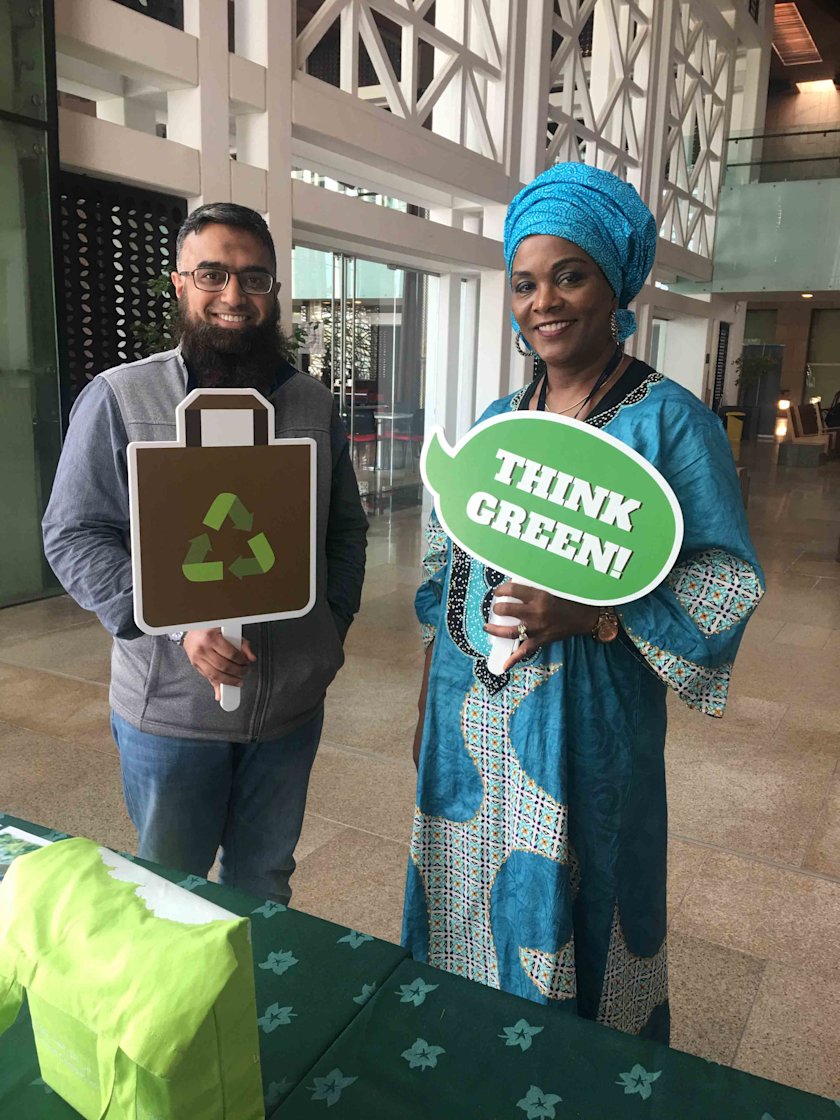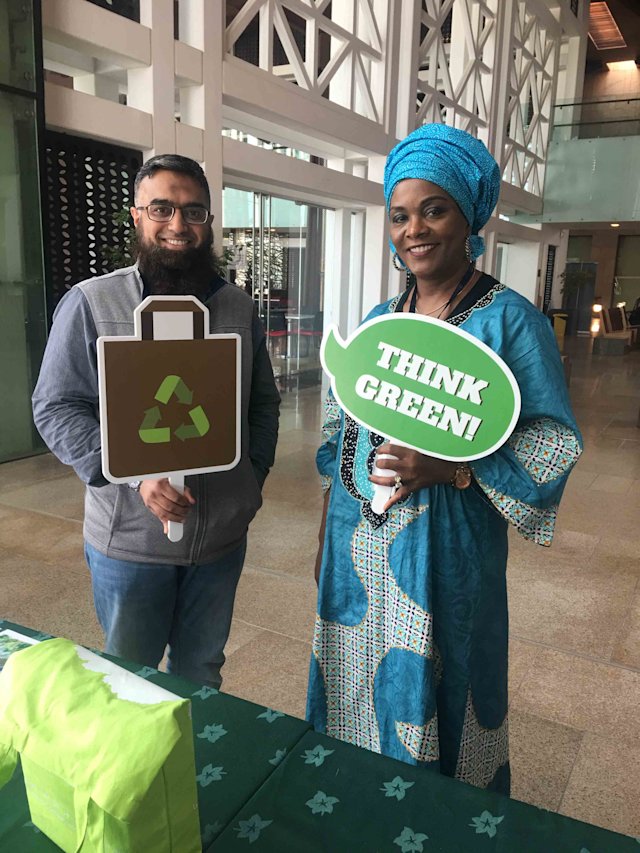Placing Values At The Core Of Change
A strong society is one that is built on strong values, where compassion and understanding are defining features, and positive change is driven by good moral character and actions that inspire others to do good for humanity.
Through its mission and its ethos as an organization, Qatar Foundation (QF) aims to empower people throughout Qatar to exhibit such morals and values – with a particular emphasis on youth – as a fundamental aspect of a sustainable, progressive, harmonious society. And that is why it established the Akhlaquna initiative.
Launched in 2017, the Akhlaquna Award recognizes members of Qatar’s community who demonstrate social awareness, compassion, and thoughtfulness toward others, improve society through the example they set, and become leaders and agents of change.
And, in 2020, QF also unveiled Akhlaquna Junior, designed to honor school students who uphold and display the morals and values that Akhlaquna seeks to promote.
A strong society is one that is built on strong values, where compassion and understanding are defining features, and positive change is driven by good moral character and actions that inspire others to do good for humanity.
Through its mission and its ethos as an organization, Qatar Foundation (QF) aims to empower people throughout Qatar to exhibit such morals and values – with a particular emphasis on youth – as a fundamental aspect of a sustainable, progressive, harmonious society. And that is why it established the Akhlaquna initiative.
Launched in 2017, the Akhlaquna Award recognizes members of Qatar’s community who demonstrate social awareness, compassion, and thoughtfulness toward others, improve society through the example they set, and become leaders and agents of change.
And, in 2020, QF also unveiled Akhlaquna Junior, designed to honor school students who uphold and display the morals and values that Akhlaquna seeks to promote.
A QF initiative that is promoting the importance of moral character and inspiring positive behaviors recognized young people who are setting an example to society – and the organization’s landscape of education became even broader.
بدأت منذ قليل فعالية جائزة #أخلاقنا وهي مبادرة لمؤسسة قطر @QF أطلقتها سمو الشيخة موزا بنت ناصر لتعزيز الأخلاق التي تتفق حولها مختلف الديانات والثقافات وتكريم الشباب الذين قاموا بمشروعات تجسّد تلك الأخلاق.
— لولوة الخاطر Lolwah Alkhater (@Lolwah_Alkhater) October 20, 2020
لمتابعة الحدث:https://t.co/EJuSRpNiUc pic.twitter.com/a1uioOzhSz
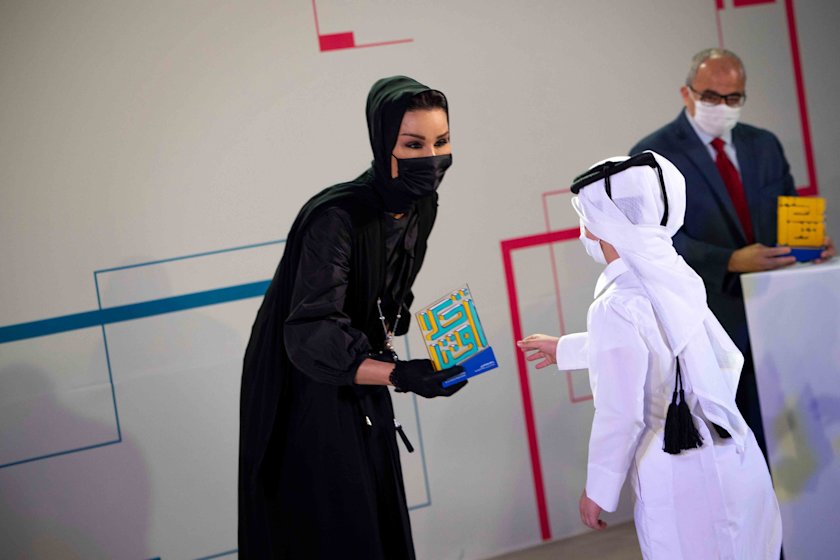
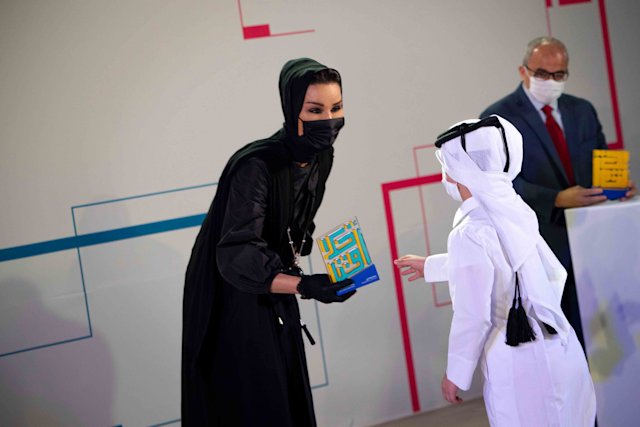
Contributing to society
In October, a special Akhlaquna Day ceremony at Education City saw the winners of the third cycle of the Akhlaquna Award and the inaugural Akhlaquna Junior Award being crowned by Her Highness Sheikha Moza bint Nasser, Co-Founder and Chairperson of Qatar Foundation.
The 10-strong team who developed student-led initiative ‘Yes I Can’ – which aims to highlight the active societal role and contribution of people with disabilities – claimed the Akhlaquna Award, with team member Fahad Saeed Al-Hamad saying: “It has great meaning for us, and we’ve participated to show our role and pay something back to our country.”
Shortlisted for the award and also recognized during Akhlaquna Day were Life Engineers, an initiative that nurtures future leaders through consultations, workshops, and summer programs; and Sign Language Translator, a motion sensor-equipped glove that translates sign language users’ hand movements.
And nine students from Grades 1-9 in schools across Qatar were honored for their efforts and the values and behaviors they exhibit and promote, in Akhlaquna Junior’s three age categories.
In October, a special Akhlaquna Day ceremony at Education City saw the winners of the third cycle of the Akhlaquna Award and the inaugural Akhlaquna Junior Award being crowned by Her Highness Sheikha Moza bint Nasser, Co-Founder and Chairperson of Qatar Foundation.
The 10-strong team who developed student-led initiative ‘Yes I Can’ – which aims to highlight the active societal role and contribution of people with disabilities – claimed the Akhlaquna Award, with team member Fahad Saeed Al-Hamad saying: “It has great meaning for us, and we’ve participated to show our role and pay something back to our country.”
Shortlisted for the award and also recognized during Akhlaquna Day were Life Engineers, an initiative that nurtures future leaders through consultations, workshops, and summer programs; and Sign Language Translator, a motion sensor-equipped glove that translates sign language users’ hand movements.
And nine students from Grades 1-9 in schools across Qatar were honored for their efforts and the values and behaviors they exhibit and promote, in Akhlaquna Junior’s three age categories.
It has great meaning for us, and we’ve participated to show our role and pay something back to our country
More than 70 projects were submitted for the third cycle of Akhlaquna
9 students received Akhlaquna Junior awards in 3 age categories
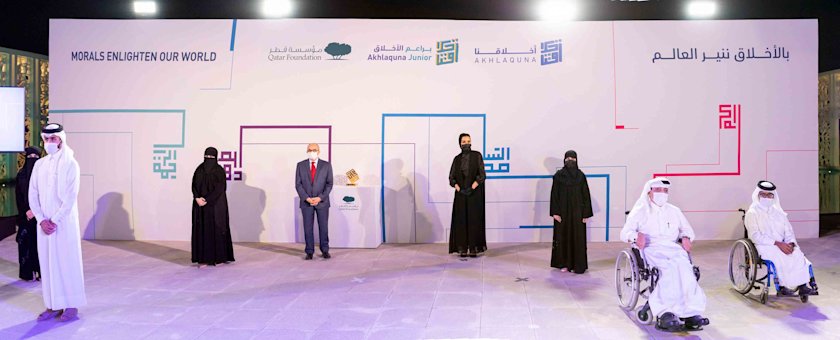
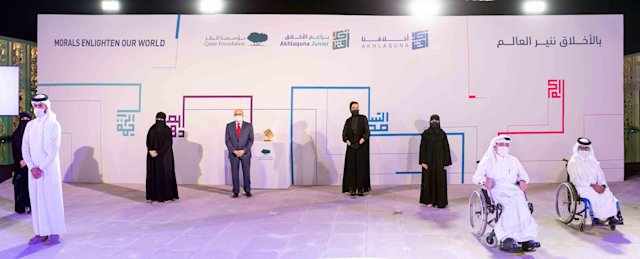
A growing ecosystem
For the past 25 years, QF’s education ecosystem has been providing tailored learning experiences that nurture creative and critical thinkers, innovators and change-makers, and future leaders.
And, in October, this ecosystem welcomed two new schools, as the Swiss International School of Qatar and Lycée Franco-Qatarien Voltaire came under the umbrella of QF’s Pre-University Education (PUE). They join a portfolio of schools that cater for children from the age of six months all the way through to high school graduates, and deliver world-class learning rooted in Arab culture and heritage.
“In the year that marks the 25th anniversary of Qatar Foundation, we are delighted that our ecosystem of pre-university education – which started with a single school – continues to expand in both size and scope,” said Buthaina Ali Al Nuaimi, President of PUE.
“These two schools perfectly align with the educational ethos of Qatar Foundation, not only in terms of their academic offering, but also their principles, beliefs, and values. They share our commitment to Leading Learning.”
For the past 25 years, QF’s education ecosystem has been providing tailored learning experiences that nurture creative and critical thinkers, innovators and change-makers, and future leaders.
And, in October, this ecosystem welcomed two new schools, as the Swiss International School of Qatar and Lycée Franco-Qatarien Voltaire came under the umbrella of QF’s Pre-University Education (PUE). They join a portfolio of schools that cater for children from the age of six months all the way through to high school graduates, and deliver world-class learning rooted in Arab culture and heritage.
“In the year that marks the 25th anniversary of Qatar Foundation, we are delighted that our ecosystem of pre-university education – which started with a single school – continues to expand in both size and scope,” said Buthaina Ali Al Nuaimi, President of PUE.
“These two schools perfectly align with the educational ethos of Qatar Foundation, not only in terms of their academic offering, but also their principles, beliefs, and values. They share our commitment to Leading Learning.”
We are delighted that our ecosystem of pre-university education – which started with a single school – continues to expand in both size and scope
QF’s Pre-University Education ecosystem now comprises 15 schools
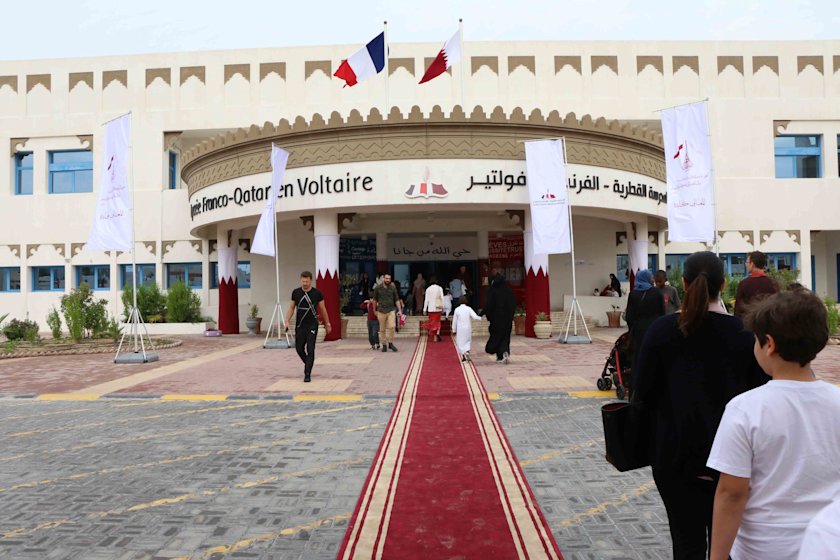
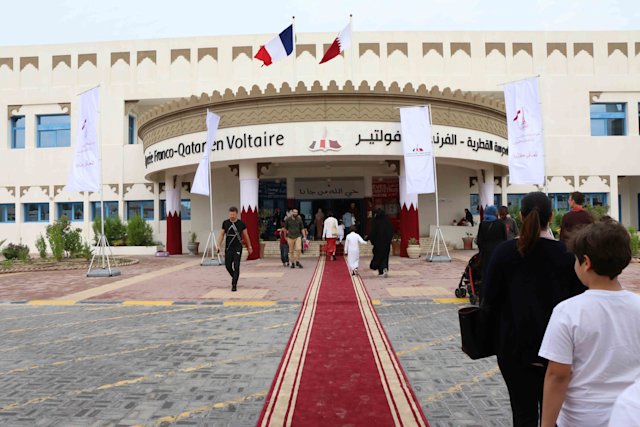
The necessity of progress
This commitment was also reflected during the month by QF's Teaching & Learning forum – a virtual gathering of education expertise and insight with the aim of exploring how, in a post-COVID-19 world, learning can become more sustainable.
Organized by PUE's Education Development Institute, participants shared and detailed their ideas in core areas for designing the learning systems of the future, from building inclusive, accessible learning communities and "glocalizing" school curriculums, to making teaching and learning more personalized.
"Change is complex and difficult," keynote speaker Professor Mel Ainscow, Emeritus Professor of Education at the University of Manchester, told the forum. "And we have to take steps slowly. But we have to make progress."
"What people have to do is demonstrate a commitment to collaboration: not just talking about it, but actually actively engaging in it. We have to be encouraging of an inquiring stance, where we're asking questions all the time, so that the school becomes an inquiring place."
This commitment was also reflected during the month by QF's Teaching & Learning forum – a virtual gathering of education expertise and insight with the aim of exploring how, in a post-COVID-19 world, learning can become more sustainable.
Organized by PUE's Education Development Institute, participants shared and detailed their ideas in core areas for designing the learning systems of the future, from building inclusive, accessible learning communities and "glocalizing" school curriculums, to making teaching and learning more personalized.
"Change is complex and difficult," keynote speaker Professor Mel Ainscow, Emeritus Professor of Education at the University of Manchester, told the forum. "And we have to take steps slowly. But we have to make progress."
"What people have to do is demonstrate a commitment to collaboration: not just talking about it, but actually actively engaging in it. We have to be encouraging of an inquiring stance, where we're asking questions all the time, so that the school becomes an inquiring place."
What people have to do is demonstrate a commitment to collaboration: not just talking about it, but actually actively engaging in it
QF’s Teaching & Learning Forum addressed 6 key streams:
- Personalizing Teaching and Learning
- Building Inclusive and Accessible Learning Communities
- Fostering Community and Individual Wellbeing
- Glocalizing the Curriculum
- Identifying and Solving Problems
- Redefining Communication
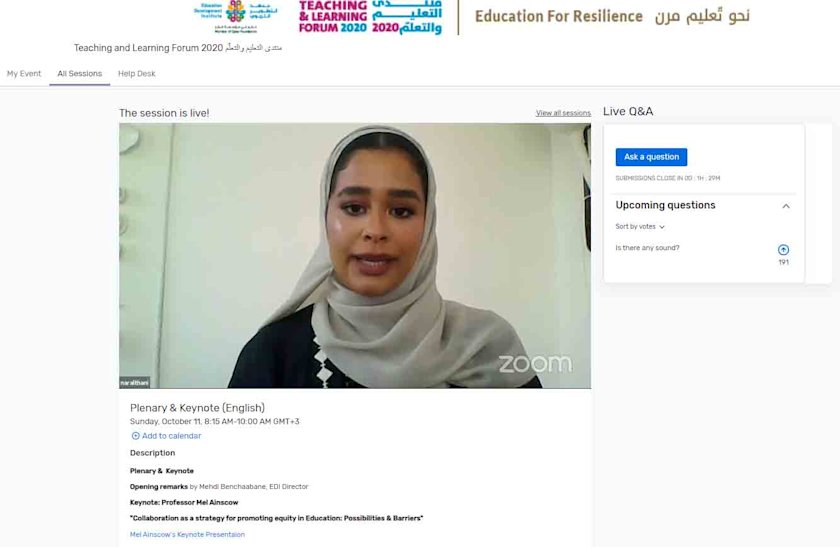
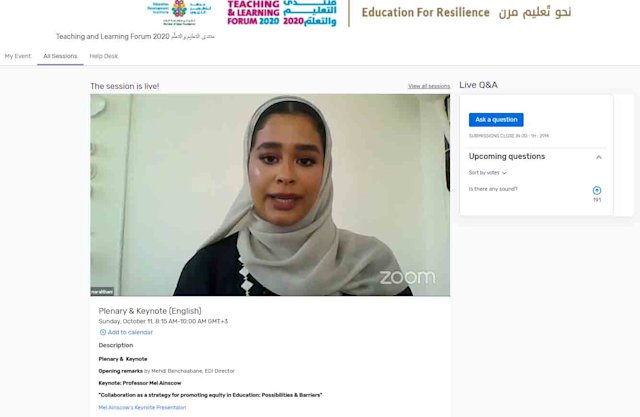
Discovery through curiosity
The spirit of inquiry led to two medical students at QF partner university Weill Cornell Medicine-Qatar joining the fight against COVID-19 by producing a research paper that provided greater understanding of how coronavirus affects pregnant women, new mothers, and newborn babies.
Reem Chamseddine and Farah Wahbeh reviewed almost 250 pregnancies detailed in dozens of scientific studies, with their findings including more evidence of the risk of the virus being passed from mother to baby during breastfeeding. “As medical students, we are encouraged to be curious and engage in the healthcare issues around us,” said Chamseddine.
“Getting to work on this project is an example of the academic values instilled in us.”
Meanwhile, students at Northwestern University in Qatar – also a QF partner university – launched a podcast-based research project, Decoding Qatar, which interviews residents to raise awareness of what it means to live, work, study, and raise a family in the country.
The spirit of inquiry led to two medical students at QF partner university Weill Cornell Medicine-Qatar joining the fight against COVID-19 by producing a research paper that provided greater understanding of how coronavirus affects pregnant women, new mothers, and newborn babies.
Reem Chamseddine and Farah Wahbeh reviewed almost 250 pregnancies detailed in dozens of scientific studies, with their findings including more evidence of the risk of the virus being passed from mother to baby during breastfeeding. “As medical students, we are encouraged to be curious and engage in the healthcare issues around us,” said Chamseddine.
“Getting to work on this project is an example of the academic values instilled in us.”
Meanwhile, students at Northwestern University in Qatar – also a QF partner university – launched a podcast-based research project, Decoding Qatar, which interviews residents to raise awareness of what it means to live, work, study, and raise a family in the country.
As medical students, we are encouraged to be curious and engage in the healthcare issues around us
245 pregnancies featured in 48 scientific studies were reviewed for Weill Cornell Medicine-Qatar’s research
Sustainable opportunities
Making art from scraps of fabric collected as memorabilia led to an alumna of Virginia Commonwealth University School of the Arts in Qatar (VCUarts Qatar) being recognized by one of the world’s top design awards.
Radheya Visperas Ponce – who graduated from the QF partner university in 2017 – created her collection of textiles, Metamorphosis, from second-hand fabrics, some donated by people who also shared with her their stories of what the pieces of cloth meant to them at points in their lives.
It led to Ponce winning the Red Dot Award Design Concept, putting her alongside companies such as Apple who have been recognized by these awards. “The four years at VCUarts Qatar triggered me to think of fashion as something beyond designing apparel, opening up a world of opportunities that were both sustainable and beautiful,” she said.
Meanwhile, VCUarts Qatar faculty and staff had a novel solution when COVID-19-enforced supply delays left them without enough new analogue cameras for students on their Painting and Printmaking course – they 3D-printed their own.
Making art from scraps of fabric collected as memorabilia led to an alumna of Virginia Commonwealth University School of the Arts in Qatar (VCUarts Qatar) being recognized by one of the world’s top design awards.
Radheya Visperas Ponce – who graduated from the QF partner university in 2017 – created her collection of textiles, Metamorphosis, from second-hand fabrics, some donated by people who also shared with her their stories of what the pieces of cloth meant to them at points in their lives.
It led to Ponce winning the Red Dot Award Design Concept, putting her alongside companies such as Apple who have been recognized by these awards. “The four years at VCUarts Qatar triggered me to think of fashion as something beyond designing apparel, opening up a world of opportunities that were both sustainable and beautiful,” she said.
Meanwhile, VCUarts Qatar faculty and staff had a novel solution when COVID-19-enforced supply delays left them without enough new analogue cameras for students on their Painting and Printmaking course – they 3D-printed their own.
VCUarts Qatar has
- 333 students of 21 nationalities
- 83 faculty of 13 nationalities
- 839 alumni
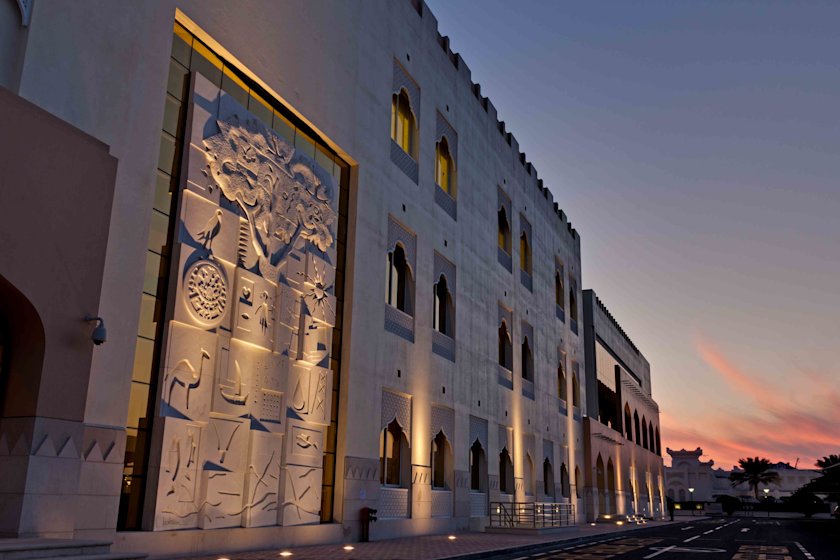
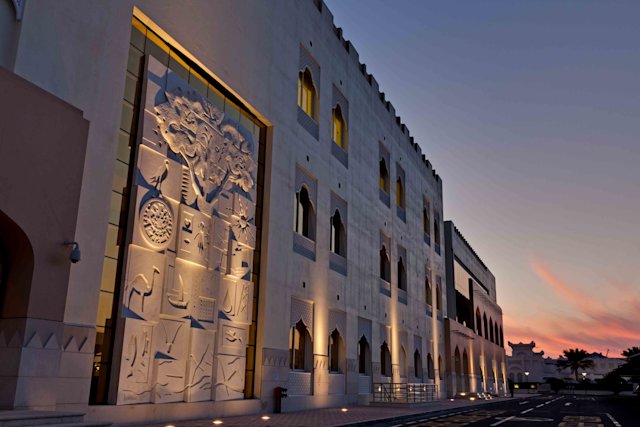
Targeting research
Using state-of-the-art Artificial Intelligence and deep-learning techniques, one of QF member Hamad Bin Khalifa University’s (HBKU) colleges analyzed a range of COVID-19 treatment options – identifying which of them could be considered as potentially effective drugs to combat the virus.
The findings of the computational research by the College of Science and Engineering (CSE) – made available to scientists and healthcare professionals around the world – indicated that statins, antivirals such as Remdesivir, the corticosteroid Dexamethasone, and the anti-parasite medicine Ivermectin improved the clinical status and lowered mortality in patients hospitalized with COVID-19.
The project was led by Dr. Tanvir Alam, assistant professor in CSE’s Information and Computing Technology Division, and PhD student Hamada Al-Absi, and the college’s dean Professor Mounir Hamdi said: “Thanks to their research, relevant stakeholders are now able to explore existing drugs and therapeutic options for other respiratory diseases.
“This raises the prospect of more efficient and targeted research into the causes, effect, and treatment of COVID-19.”
Using state-of-the-art Artificial Intelligence and deep-learning techniques, one of QF member Hamad Bin Khalifa University’s (HBKU) colleges analyzed a range of COVID-19 treatment options – identifying which of them could be considered as potentially effective drugs to combat the virus.
The findings of the computational research by the College of Science and Engineering (CSE) – made available to scientists and healthcare professionals around the world – indicated that statins, antivirals such as Remdesivir, the corticosteroid Dexamethasone, and the anti-parasite medicine Ivermectin improved the clinical status and lowered mortality in patients hospitalized with COVID-19.
The project was led by Dr. Tanvir Alam, assistant professor in CSE’s Information and Computing Technology Division, and PhD student Hamada Al-Absi, and the college’s dean Professor Mounir Hamdi said: “Thanks to their research, relevant stakeholders are now able to explore existing drugs and therapeutic options for other respiratory diseases.
“This raises the prospect of more efficient and targeted research into the causes, effect, and treatment of COVID-19.”
HBKU has 6 colleges:
- College of Islamic Studies
- College of Humanities and Social Sciences
- College of Science and Engineering
- College of Law
- College of Health and Life Sciences
- College of Public Policy
The smart approach
October also saw a group of researchers at HBKU’s CSE make strides in developing intelligent wearable devices, capable of accurately detecting and monitoring a set of physical health parameters in real-time – an idea conceived even before COVID-19 struck,
The prototype “smart mask” features printed nanomaterial multisensory patches – designed to be lightweight and worn like a medical face mask – can measure body temperature, respiration, humidity, and irregularities in breathing patterns. It is now set to be registered as a patent.
“The smart mask represents a significant step forward in applying smart technology in people’s everyday lives, to improve modern quality of life,” said Dr. Amine Bermak, Professor and Associate Dean of CSE. “Such technology will remain long after the current pandemic is history.”
And during the month, another HBKU college – the College of Public Policy – announced a major new program for social policy evaluation and research, called PROSPER – the first of its kind to cover Qatar and the Middle East and North Africa region.
October also saw a group of researchers at HBKU’s CSE make strides in developing intelligent wearable devices, capable of accurately detecting and monitoring a set of physical health parameters in real-time – an idea conceived even before COVID-19 struck,
The prototype “smart mask” features printed nanomaterial multisensory patches – designed to be lightweight and worn like a medical face mask – can measure body temperature, respiration, humidity, and irregularities in breathing patterns. It is now set to be registered as a patent.
“The smart mask represents a significant step forward in applying smart technology in people’s everyday lives, to improve modern quality of life,” said Dr. Amine Bermak, Professor and Associate Dean of CSE. “Such technology will remain long after the current pandemic is history.”
And during the month, another HBKU college – the College of Public Policy – announced a major new program for social policy evaluation and research, called PROSPER – the first of its kind to cover Qatar and the Middle East and North Africa region.
The smart mask represents a significant step forward in applying smart technology in people’s everyday lives
HBKU’s College of Science and Engineering has 382 students
Precision and vision
Qatar’s foresight in investing in precision medicine for the health of future generations was praised by a US Congressman, as he and two fellow American politicians visited QF.
Representative Eric Swalwell, who represents California’s 15th congressional district, is leading a bipartisan effort in the US Congress to advance precision medicine, which is a key strand of QF’s research, development, and innovation efforts.
“Precision medicine can drastically improve treatment and dramatically bring down the cost of healthcare,” explained Representative Swalwell. “Personalized medicine can target treatments to only those patients who will benefit from them, and eliminate the need for costly hospitalizations, making health systems more effective and efficient.
“Qatar’s focus on precision medicine is prescient. As genomic sequencing becomes less expensive, opportunities increase to diagnose patients sooner and treat them more effectively.”
The visit also saw Congressman Jim Himes, from Connecticut, describe Qatar as “a model for reform in the Arab world and a leader in women’s rights”, and “a bridge between the Islamic world and the West”.
Qatar’s foresight in investing in precision medicine for the health of future generations was praised by a US Congressman, as he and two fellow American politicians visited QF.
Representative Eric Swalwell, who represents California’s 15th congressional district, is leading a bipartisan effort in the US Congress to advance precision medicine, which is a key strand of QF’s research, development, and innovation efforts.
“Precision medicine can drastically improve treatment and dramatically bring down the cost of healthcare,” explained Representative Swalwell. “Personalized medicine can target treatments to only those patients who will benefit from them, and eliminate the need for costly hospitalizations, making health systems more effective and efficient.
“Qatar’s focus on precision medicine is prescient. As genomic sequencing becomes less expensive, opportunities increase to diagnose patients sooner and treat them more effectively.”
The visit also saw Congressman Jim Himes, from Connecticut, describe Qatar as “a model for reform in the Arab world and a leader in women’s rights”, and “a bridge between the Islamic world and the West”.
As genomic sequencing becomes less expensive, opportunities increase to diagnose patients sooner and treat them more effectively
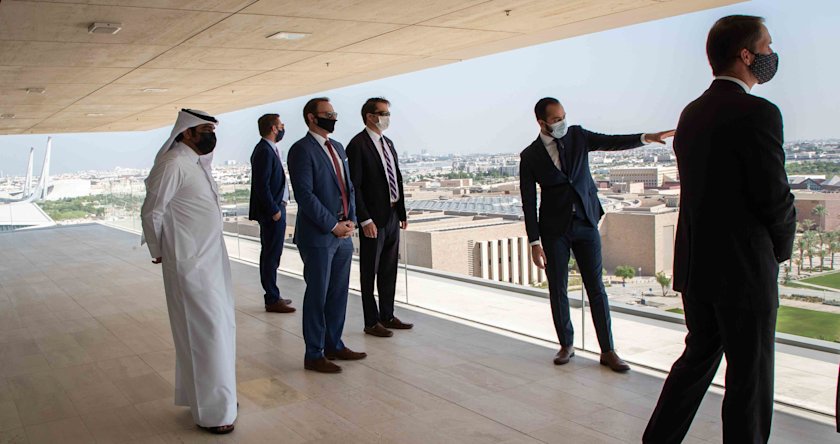
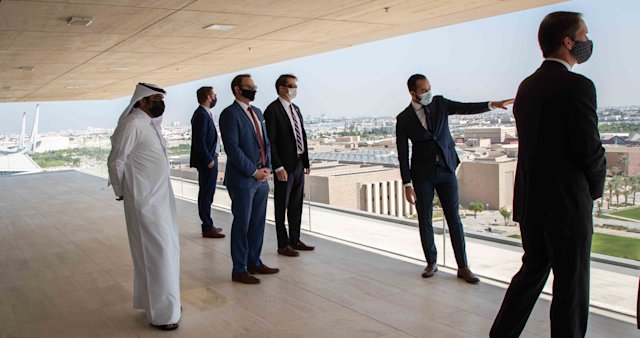
Leading by example
QF aims to be a leader of sustainability, which involves leading by example – and the way it is doing this within its own environment was illustrated in October.
A new report outlined the impact of QF’s efforts to reduce single-use plastics in Education City, not only through policies that are producing results, but also through behavior-nudging campaigns and awareness programs that steer QF’s community toward making more environmentally-conscious choices.
This approach means, on a monthly basis, around 112,000 plastic bottles and 120,000 plastic bags are no longer being used at QF, with plastic waste on Education City construction sites being reduced by 20 percent.
“Banning single-use plastics at Education City has been very effective,” said Ouassim M. Alami, Strategic Initiatives Advisor, QF Operations. “But just as important is our current work to empower the community to act for the environment and protect it.”
QF aims to be a leader of sustainability, which involves leading by example – and the way it is doing this within its own environment was illustrated in October.
A new report outlined the impact of QF’s efforts to reduce single-use plastics in Education City, not only through policies that are producing results, but also through behavior-nudging campaigns and awareness programs that steer QF’s community toward making more environmentally-conscious choices.
This approach means, on a monthly basis, around 112,000 plastic bottles and 120,000 plastic bags are no longer being used at QF, with plastic waste on Education City construction sites being reduced by 20 percent.
“Banning single-use plastics at Education City has been very effective,” said Ouassim M. Alami, Strategic Initiatives Advisor, QF Operations. “But just as important is our current work to empower the community to act for the environment and protect it.”
QF’s sustainability efforts mean 112,000 plastic bottles and 120,000 plastic bags are not being wasted each month
Just as important is our current work to empower the community to act for the environment and protect it
